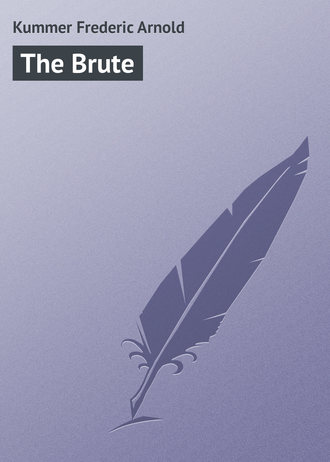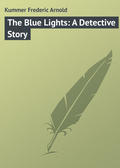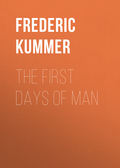
Kummer Frederic Arnold
The Brute
Donald drained his glass. “I suppose you will be busy for a couple of hours,” he said, “with your legal matters. Why not come up to my office when you get through – I’m in the Columbia Building, you know – and we’ll go up-town together?”
“I’ll do it. We can stop at my hotel on the way, and give me a chance to clean up a bit. I only got in this morning on the sleeper, you know, and I feel a bit grubby.”
Some half-hour later they were making their way slowly toward Broadway. “What a great town it is, after all!” remarked West, as they turned the corner at John Street. “Every time a fellow goes away for a few years they seem to build it all over again before he gets back.” He turned to look at the towering mass of the Singer Building. “That’s a new one on me. Wouldn’t it make some of my friends back in Colorado have cricks in their backs?”
“It is a wonderful city,” replied Rogers grimly. “I don’t think I should ever care about living anywhere else, but the man who wins out in it has got to deliver the goods. Big as it is, there is no room in it for failures.” He waved his hand to West as the latter turned into Wall Street. “See you around four-thirty. So long.”
“I’ll be there. Wait for me if I’m a little late,” was the reply, as the two separated.
Donald went back to his plain little office and his power-transmission problem with a curious feeling of futility. Thirteen years of hard work had given him but little more than the right to fight that never ceasing battle with the grim city which could excuse anything but failure. West – pleasure-loving Billy West – who from his freshman days had looked upon the world as little more than an amazing joke, had by one stroke of fortune suddenly found all the pleasures, all the luxuries that life contained, at his feet. He did not envy West this good fortune, he was too staunch a friend for that, but he thought of Edith, and their little up-town flat, and as her tired face rose before him he suffered the pangs of that greatest of all forms of poverty, the inability to do for those we love.
CHAPTER III
During the year that preceded her marriage to Donald Rogers, Edith had seen a great deal of Billy West, and had liked him more than anyone except herself had realized. His was a personality, indeed, to compel the admiration of women. Tall, good-looking, of a reckless and laughter-loving type, he naturally appealed to that peculiar chord in the feminine make-up which responds so readily to the Cavalier in the opposite sex, while paying scant attention to the sturdy adherence to duty characteristic of his Roundhead adversary. For this reason, it is probable that, at one period of Donald’s courtship, she would have listened more kindly to the love-making of his friend, had the latter, indeed, seen fit to make any. That he did not was due to no Quixotic sense of friendship for Donald, but to a very real and honest belief on his part that marriage on the slender pay of an assistant chemist was not for one of his type, an opinion in which he was entirely correct. Therefore he had hidden his love, which was in truth a real and lasting one, beneath his careless laughter, and had gone to Colorado when the occasion offered, neither heart whole nor fancy free, but just as determined to make much money with the utmost quickness as though he and Edith Pope had never laid eyes upon each other. After all, he and Edith were very much alike. They belonged to that class which demands of life its luxuries almost before its necessities, and it is a curious fact that they nearly always get them.
After eight years of married life, Edith Rogers, busy with her child, her household cares and the various complexities of domesticity, had forgotten her husband’s friend as completely as though he had never come into her life at all. He, on the contrary, had thought of her continually, for his life in the West had been too keenly devoted to business to leave either time or opportunity for dalliance with the opposite sex. Hence the memory of his first and last love had not been effaced by the passage of time, but remained in his heart as a sweet and pleasing memory, gathering increased strength from the years as they rolled swiftly by. It should not be inferred from this, however, that William West had the slightest thought of ever renewing his courtship of Edith, now that she had become Donald Rogers’ wife. His love for her was like a pleasant recollection, a package of old letters, a book read and closed forever. For all that, he was conscious of a queer feeling in the region of his heart as he followed Donald into the tiny living-room of the Rogers’ apartment in Harlem.
Mrs. Rogers had not been apprised of her husband’s intention to bring a guest home for dinner, least of all so unexpected a one as Billy West. The reason for this was that the Rogers’ apartment boasted no telephone. The servant problem they had solved by the simple expedient of not keeping any. Hence it was that West’s first glimpse of the Edith of his dreams was of a tired little woman, flushed from her efforts over the gas range, and in no sweet temper with her husband for having taken her unawares and at such a disadvantage. It is a fact worthy of record, however, that West found her, in this homely garb, more humanly delightful and attractive than would have been the case had she spent hours of preparation at her toilette table. He had been living for five years among men who found women more attractive as helpmates than as ornaments, and she appealed to him accordingly. As for Donald, no thought crossed his mind that these two were, or ever had been, anything more to each other than the best of friends.
“Billy!” Mrs. Rogers had gasped as she came into the room to greet her husband on his arrival, and had thus, by using the old familiar title, established a footing between them that somehow refused to return to the more formal one of “Mrs. Rogers” and “Mr. West.” After all it was of no great importance – Billy and Edith they had always been to each other, and Billy and Edith they remained. Donald, if he noticed it at all, was glad of the fact that his wife and his old friend liked each other so well. The meeting became a little reunion, in the pleasure of which Mrs. Rogers soon forgot her plain, cheap house-gown and her flushed face, and entered into the spirit of the occasion with an unwonted gayety. She was a beautiful woman, in spite of her twenty-eight years; perhaps it would be more correct to say because of them, for while at twenty she had been exceedingly pretty, it was little more than a youthful promise of what she had now become.
Her grandmother had been a Southern woman, and a noted beauty in those much talked of days “before the war,” and whether this lady’s beauty had, as time passed, taken on added glory, like most other things of that hallowed period, certain it is that Edith Rogers had received from some source a priceless inheritance as far as the perfection of her figure or the beauty of her coloring was concerned. Perhaps it was some forgotten strain of Irish blood that was responsible for her deep violet eyes and her dark chestnut hair, although her dusky complexion belied it.
West observed the change which the years had made in her, at once, and complimented her on it. “I have never seen you look so well,” he said, as he grasped her hand. “You were a rosebud when I went away, now you are an American beauty.” It pleased her mightily, for she felt that he meant it, and, like most married women, she heard few compliments from her husband. Mrs. Pope, her mother, never lost an opportunity to tell her that with her looks she could have married any man she pleased, but she paid no attention to remarks of this nature, knowing as she did that her mother was only trying to hit, indirectly, at Donald, whom she affected not to like.
She knew from West’s voice that he was very glad to see her, and after all these years, when he grasped her hand, and pressed it in his strong, firm grip, she felt the old familiar shock, the sensation of gladness for she knew not what, that almost took her breath away. It had always been that way with him. He was very different from Donald in many ways, for, while Donald was serious and earnest and very conscientious, West was always merry and gay and careless, never seeming to worry about money, although his income, at the time of her marriage, had been smaller even than Donald’s.
There was something about him that always attracted women. She felt this whenever she was with him, yet it did not come from any appreciation of his character, or his mind, for she knew very little about either. There was some sort of psychic magnetism about the man, some vibrating sense of physical vitality, which she felt whenever she was near him. His mere presence made her strangely silent and in a way afraid, yet, whatever it was that she feared, it at the same time attracted her, and made her sorry when it had passed. She had never felt that way with Donald, although always she had liked to be with him, for somehow she felt more comfortable and sure, and could talk things over better, and plan out the future. She had not thought much about the future when she was with West – there did not seem to be any need for a future – the present had been all she had desired, but that she had desired very much. All this had passed, years ago, but still it came back to her, in a measure, when she thus first met him again.
He looked at her, in that curiously intimate way he had, and even his smile made her happy. She felt his glance sweep over her face, her whole body, and almost embrace her in its pleasant radiance – it thrilled her, yet she almost resented the way in which it left her helpless and confused. In a moment he had looked beyond her, at Donald, and was making some laughing inquiry about their boy – and then she felt sorry and wanted him to look at her again.
Mrs. Pope had taught her daughters many things, but cooking was not one of them. Edith had been forced, like many another married woman, to learn it in the school of hard practical experience, and, to her credit be it said, she had learned it surprisingly well. She excused herself after the first greetings had been said, added an extra dish to the partially prepared meal, and hastened to her room to change her dress. Of West’s new fortunes she as yet knew nothing; it was to the man that she wanted to appeal, to the old friend, before whom her natural woman’s vanity made her wish to appear at her best. When she served the dinner half an hour later, it was in a light-green pongee that seemed to West a triumph of the dressmaker’s art. As a matter of fact she had made the dress herself, but it would have taken a far worse costume to have spoiled the lines of her superb figure, or dulled the sparkling mobility of her face.
Donald, with a father’s pride in his boy, dug out Bobbie from the recesses of his mother’s room, and brought him to West to be admired. He was a manly little fellow, with a large share of his mother’s good looks, and West took him upon his knee, wondering inwardly if he would ever have a son of his own to inherit his newly acquired fortune.
To the boy he told stories about the Indians that made the youngster open his eyes very wide indeed, and Uncle Billy, as West admonished him to call him, became at once a very important personage in his childish eyes.
It was when dinner had progressed to the stage of the salad that Donald mentioned the matter of West’s sudden rise to fortune. “Billy had made a ten-strike in the West,” he remarked to his wife. “Discovered a gold mine.”
“Really!” Edith laughed. “Is there any gold in it? Almost all the gold mines I ever heard of were lacking in that important particular.”
“This one wasn’t.” Donald looked at West and laughed. “Billy tells me it’s made him worth half a million.”
Mrs. Rogers gasped, then turned to her guest. “You are not in earnest?” she inquired wonderingly. “Half a million?”
“About that,” said West, trying to look as if he were speaking of the price of a new hat, or something equally unimportant.
“But you – you don’t seem a bit excited about it, or anything.” Mrs. Rogers’ own eyes were big with interest. “I should think you would be simply overcome. I know I should. Half a million!” She glanced unconsciously about the poorly furnished little room and sighed. Donald noticed it; her thoughts, for the moment, had been his own.
“I was excited enough when I found it,” remarked West with a chuckle. “It came like a snowstorm in August. Last thing in the world I had expected – at least just then.”
“I suppose you just stood up and shouted,” said his hostess.
“No, I didn’t. I lit my pipe. I didn’t want the rest of the bunch to know about it.”
“Tell us the whole story.” She was as interested as a child. Half a million dollars sounded like such a vast amount of money. All her life she had imagined what she would do if she were only rich. She had often thought it all out, in her day dreams – how she would give her mother so much for the trip to Europe that she was always talking about, and her sister so much more for the diamond necklace she wanted, and have an automobile and a place at the seashore and many other things. She had an exalted opinion of wealth and its possibilities; if she had known any wealthy people she would probably have found them very much like everyone else, complaining about the price of beef, and the difficulty of keeping one’s servants and paying one’s bills. She believed that it was not what one has, but what one has not, that counts. The sound of West’s voice interrupted her thoughts.
“There isn’t much to tell. I was on my vacation at the time, and there were about a dozen of us, camping up on the Little Ash river. There hadn’t been any gold found in that section, before that, but I was always looking out for it – you see I had studied the formation up that way the summer before, and I was certain the rock was there. The boys used to make a good deal of fun of me, poking about with my geologist’s hammer, instead of fishing or the like. It was the last day of our stay, I remember, and we had already begun to get our things together, in readiness to break camp in the morning. I had strolled up the river a few hundred yards, feeling a little disappointed at going back to Denver without even a piece of iron pyrites, when I noticed a sort of whitish streak in the rocky bank just a little above where it rose from the edge of the river. It was mostly covered with underbrush and thick bushes, and I wonder that I saw it at all. I climbed down and took a good look, and then I just sat down on a rock and got out my pipe and had a good smoke. I felt somehow as though a new life had begun for me, and I wanted time to think things out. After a while I broke off a few samples of the quartz – it was a beautiful outcropping, with a pay streak in it as thick as your two fingers – and I stowed them away in my pocket and strolled back to camp as though nothing had happened. One of the boys said, as I came up, ‘Find your gold mine yet?’ and laughed. ‘Yes,’ I said, ‘and it’s worth a million.’ They all laughed, for they thought I was joking, but I felt my bits of quartz in my pocket and said nothing. We got back to town the next afternoon and I had made my assays before I turned in that night.”
“And then you knew?” she asked eagerly.
“Yes. I staked out my claim very quietly. Of course I gave up my position the next day. After I had had the claim registered, I went to see a man in Denver that I had come to know pretty well – he was the representative of a wealthy crowd in Boston who dealt extensively in mining properties, and I told him what I had. I won’t bother you with the details. We formed a company, and they gave me half of the stock and made me vice-president, and then we started in to work the claim. In six months we had got in our stamping mills and were taking out ore. The rock got better, as we went into the hill, and we began to pay dividends almost from the start. There isn’t any of our stock for sale now. I don’t have much of anything to do with the management. It’s in good hands, and last month, when I saw that everything was working smoothly, I made up my mind to come East, and look up some of my old friends.” He glanced at Donald as he said this, and then at Edith, and she felt somehow, that he wanted her to feel that it was she that he meant.
She began to see, that very evening, something of what it meant to have so much money that it was not necessary to think about how one spent it. When West suggested, after dinner, that they all go to the theater, she said at once that it was too late – that they would never be able to get tickets at that hour. It was then close to eight o’clock, but West laughed, and said he would see to the tickets, so she put on her hat and they went.
When Donald and she went to the theater, which was not very often, they used to think about it for days ahead and were delighted if they were able to get good seats in the balcony at less than the prices charged downstairs.
Their evening was a delightful one. They whirled down-town to the theater in a taxicab, and went to supper afterwards at one of the best-known restaurants, where Edith wondered how the countless array of young and very beautiful women managed to get such gorgeous gowns and such magnificent jewelry. She and Donald did not often patronize such places.
They came home in a whirl of excitement, and Edith lay awake a long time after she had gone to bed, wondering if after all her mother had not been right in urging her to marry for money. She looked at Donald, who lay at her side, and thought long, long thoughts. She was not conscious of any disloyalty to him – she liked Donald very much – he seemed almost like a dear friend. Presently she began to try to analyze her love for him, her marriage, and her after life. She respected and admired his mind, his character, but was there not, after all, something else in life – something deeper and more vital in the marriage relationship, something that she had missed? Why was it that Donald’s presence, his touch, his look even, gave her no such glow of happiness as she had suddenly found with this man who had been a stranger to her for so many years? It was wrong, she knew, but clearly there was something lacking. Bobbie, waking fretfully, brought her to a sudden sense of the realities of life. She got up and placed an extra cover over him, and when she had once more succeeded in putting him to sleep her questions seemed for the time being answered.
CHAPTER IV
West spent the next few days in getting comfortably located in New York, laying in a supply of new clothes, and purchasing an automobile. His life in Colorado had been unusually simple, since, with his time almost entirely given over to business affairs, he had had neither inclination nor opportunity for amusement. Now, however, he felt himself on a holiday. His bank account was bulging with unspent income, and he frankly admitted to himself that he had come to New York to spend it. Edith, who seemed almost continually in his mind, provided the necessary outlet, and he pictured the two of them making many delightful excursions into the country about New York in the big touring car which he had selected.
During his visits to tailors, bootmakers, haberdashers, and the like, he found time to send her a huge box of violets on two different occasions, and, with a vague idea of salving his conscience, hunted up Donald one day and took him to luncheon.
It was nearly a week after his first visit to the Rogers’ apartment that he suddenly made up his mind to call, and, as luck would have it, Donald was not at home on that particular evening, having gone to a meeting of one of the engineering societies of which he was a member. The absence of a telephone brought West before the Rogers’ door without any previous knowledge of his friend’s absence. Edith, who was sitting alone, reading a magazine, and, to tell the truth, thinking of West himself and wondering what had become of him, received her caller with unfeigned gladness and insisted upon his remaining until Donald’s return, which, she assured him, would not be late. Between spending the evening alone at his hotel, and here with the woman he had half-begun to believe was dearer to him, in spite of the lapse of years, than anyone else in the world, there was no choice. West came in and sat down, delighted at the opportunity which fate had thus generously accorded him.
They talked along conventional lines for a time, West entertaining her with an account of his experiences during the past week, and dilating upon the merits of his new automobile, which he insisted she must try at once. Edith was delighted at the prospect – he told her that he was taking lessons in driving, and would soon be able to manage it with the best of them.
After a time, the topic having been exhausted, a silence came upon them, one of those portentous intervals that form a prelude to the expression of the unspoken thought, the unbidden wish.
Edith was more than ever conscious of some powerful attraction in this man; he seemed to represent vast possibilities – possibilities for future happiness – of what nature she did not dare even to ask herself. She felt, whenever she was with him, a strange confidence in the outcome of things; although what things she did not know. “I should be so glad to go,” she had said, in reply to his suggestion regarding the proposed automobile trips. “I am alone so much!” There had been a touch of sadness in her voice that did not escape him. He looked at her keenly. “Are you happy, Edith?” he asked with directness which startled her.
“Why – yes – of course I am. I hope you do not think that I was complaining. I only meant that I am a good deal alone during the day, and – and – ” She hesitated. He knew quite well that she was not happy – or, at least, that she found her life far more empty than she had ever dreamed it would be when she married.
“ – And you will take pity on a lonely bachelor,” he completed her sentence for her. “As a matter of fact, I haven’t anyone else to go about with, you know.”
“And so you fall back on me. You’re not very complimentary, Billy. I’ll have to find someone to help you spend your money.” She laughed, watching him narrowly as she spoke. After her eight years of married life, the subtle flattery of this man’s attentions seemed doubly sweet, and, woman-like, she wanted to hold on to them, and enjoy them, as long as she could.
“I don’t think I’d care about any young girl,” he remarked gravely. “You know I always liked you better than anyone else, Edith, and I’m glad to say I still do.”
“In spite of my gray hairs,” she laughed. She had none, as a matter of fact, being especially youthful in appearance for a woman of nearly thirty, but she longed for the compliment she felt sure her remark would elicit.
“In spite of everything,” he declared, “I have never forgiven Donald for cutting in and marrying you while I was away trying to make a fortune to lay at your feet.” He spoke banteringly, with a laugh, but something in his voice told her that he was far more in earnest than his manner indicated. “Now that I have made it, I am determined that you shall have some pleasure out of it.”
“That’s very sweet of you, Billy,” she said, with a touch of gravity in her manner. “I cannot tell you how much I appreciate it.”
“Nonsense. Think what old friends we are. If you will take pity on my loneliness, and all that, I shall feel that I am the one who should be grateful.” He rose from his chair and came over to where she sat, near the desk. “Do you know, Edith,” he said suddenly, “that in all the time I have been away I don’t suppose a single day went by that I did not think of you?”
“Don’t tell me that, Billy. If you thought of me once in six months you did well.” Her nervous laugh, as she attempted to meet his gaze, sounded unconvincing. She almost began to believe that he had thought of her every day.
“Do you remember that picture you once gave me – the one in the big Leghorn hat?”
“Why, yes,” she answered slowly.
“I’ve had it on my dresser always, wherever I’ve been – it was the last thing I looked at when I went to bed at night. So, you see, I did think of you every day – honestly.”
She felt her color coming – something in his manner, as he stood there gazing down at her, alarmed her. She felt that he still loved her, and that it would be only a question of time until he should tell her so. She was by no means prepared for any such rupture in their friendly relations, for rupture she knew it would certainly be, should he speak. She rose hastily and went toward the piano.
“Shall I play for you?” she asked. In the past it had been his invariable habit to ask her to do so.
“Will you?” His voice showed his appreciation of the fact that she had remembered.
“What would you like?”
“Oh, anything – it’s been so long since I’ve heard any good music!” He joined her at the piano. “How about that beautiful thing you used to sing sometimes – Massenet’s ‘Elegy,’ wasn’t it? Don’t you remember I always said I’d rather hear you sing that than listen to a grand opera?”
“Oh – I couldn’t. I haven’t sung for years.”
“What a pity! I shouldn’t think Donald would let you give it up.”
“Donald doesn’t care much for music.” She felt as she spoke that she had in some way criticized her husband and hastened to make amends. “He’s too busy – that’s the reason. Donald is working very hard, and has to do a lot of work at home – nights. If I sang, it would bother him.” She began to play the piece with considerable feeling and skill, and West, who was intensely fond of music, leaned over the piano and watched her happily. To have this woman all to himself seemed to him the only thing that fortune had denied him. The love which had lain so quiet all these years surged up within him with unsuspected force. His arms longed to draw her to him, to clasp her to his heart. He looked at her expressive, delicate face, her round, smooth neck, her dark, heavy hair, and wondered how Donald could bring himself to think that she could possibly be happy in the position of a mere household drudge. His reflections did Donald scant justice; the latter, poor fellow, was trying with all his strength to lift both Edith and himself out of their present environment, but Donald was a silent man, who endured all things patiently, and he expected his wife to do the same.
West’s intentions, if, indeed, he admitted to himself that he had any at this time, were directed toward two ends – his own amusement and Edith’s. Perhaps amusement is not the exact word – it was more than that to him, for he could have amused himself with many women. He was really very fond of Edith, more so, perhaps, than he himself fully realized, and in giving her pleasure he gave himself pleasure as well. The idea of making love to her, of coming in any way between herself and Donald, had never entered his mind. After all, we so rarely erect barriers against certain experiences in life until after they have occurred, by which time barriers are no longer of any avail.
When Edith stopped playing, West begged her to go on, and presently, running into the accompaniment of “Oh, Promise Me,” she began to sing in a clear, sweet voice which brought back to him the evenings, long before, when she had sung this song to him. Unconsciously the years passed from them – he joined in the chorus of the song with his uncultivated, yet not unmusical, baritone, and once more they seemed back in the boarding-house parlor, she the young girl with life all before her, and he the happy-go-lucky Billy West, making and spending his small salary with joyous indifference as to the future.
He stayed until nearly half-past ten, hoping that Donald would return, but the latter evidently had been kept longer than he expected. Edith did not press him to remain – somehow, in spite of her old friendship for West, it seemed a bit queer, this sensation of being here alone in her apartment with a man other than her husband. She did not propose to conceal the fact of his having been there from Donald, but it seemed to her easier to tell Donald that Billy had called during his absence than to have him come in and find them together even as innocently engaged as they were. She knew that this feeling on her part was absurd, that Donald would not have the least idea of jealousy or suspicion – he was too clean minded a man for that. Her scruples arose from a deeper cause. She had begun to think about West in a way that caused her to feel guilty of disloyalty to her husband when no disloyalty had occurred – to desire to avoid the appearance of evil where no evil existed. All that she had done had been to liken her life with Donald, to what it might have been had she married West. It is a curious fact that the best of women are willing at times to compare the husband at his worst, with the lover at his casual best, and judge both accordingly.
West rode back to his hotel in a maze of doubts. He was genuinely fond of Donald – he liked him better than any man he knew, and this, probably, because he was in all things so nearly the other’s opposite. He wondered whether Donald would object in any way to the attentions he proposed showing Edith – whether he would become jealous, and feel that his wife’s place was at home, rather than dashing about in a five-thousand-dollar automobile with another man. Perhaps it would be but natural that he should, although not by nature a jealous man, and West realized the confidence that he placed in both his wife and himself. What West did not realize was the effect which his money and the pleasures and luxuries it could command would have upon this woman whose married life had been one long lesson in economy. He had no conception of the contrast in Edith’s life between a quiet existence in a Harlem flat and the land of dreams to which his money was the open sesame, the golden key, unlocking the barriers between poverty on the one hand and all that the heart could desire on the other. He did not, could not, realize the upheaval which would necessarily take place in her life, the dissatisfaction which must inevitably ensue, if she were once drawn into a whirl of pleasures and excitements to which her existence for so many years had been totally foreign. If she and Donald lunched or dined together at an expensive restaurant it was an event, commemorating some anniversary – such as their wedding or a birthday. West, on the contrary, regarded dropping into any of the hotels or cafés for luncheon or dinner as a most ordinary performance – he was forced to do it himself, and his only desire was for company. As for going to the theater, he knew that the best seats were always obtainable at the hotels, or on the sidewalk – at a small advance in price, it is true. But what difference did that make to a man who had a hundred dollars a day to spend and no reason whatever for not spending it?







